|
|
|
Sort Order |
|
|
|
Items / Page
|
|
|
|
|
|
|
| Srl | Item |
| 1 |
ID:
117138
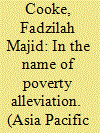

|
|
|
|
|
| Publication |
2012.
|
| Summary/Abstract |
Oil palm in Sabah is grown in large plantations or smallholdings, the latter mostly managed by indigenous peoples on untitled customary land. Government development agencies have long focussed on improving the productivity of smallholders for poverty alleviation. For most smallholders, the main issue is tenure insecurity: as long as lands remain untitled they are subject to changes in land allocation and land use at the discretion of the State Government. Indigenous claimants seek recognition of the right to use and occupy ancestral lands via individual Native Titles (NT), as provided for in the Sabah Land Ordinance (SLO). Recent official push for converting such 'idle' customary lands by promoting large scale joint ventures between customary landowners and oil palm companies is creating anxiety among many indigenous groups. The joint-venture approach has been enabled through a crucial amendment to the SLO that promotes the granting of communal titles (CT) with conditions attached. This tenure instrument empowers state-appointed trustees to make key decisions concerning land use where commercial crops (especially oil palm) are favoured and on the eligibility of descendants (pewaris) to participate in the joint venture or not. The complexity of local concerns and official responses is captured via a case study at Lalampas in the Tongod District of Sabah.
|
|
|
|
|
|
|
|
|
|
|
|
|
|
|
|
| 2 |
ID:
117142
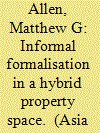

|
|
|
|
|
| Publication |
2012.
|
| Summary/Abstract |
Across post-colonial Melanesia, the benefits and costs of 'mobilisation' of customary land for economic development remain much debated among scholars, activists, policy-makers and the donor community. This paper presents a case study from Solomon Islands of a hybrid property space in which smallholder oil palm blocks are being established on customary land through an informal 'smallholder land use approval' system. This system provides salutary evidence of how customary land can be engaged for commercial agricultural activity without recourse to formalisation. It also potentially provides a more equitable pathway for landowners, especially women and young men, to engage in the oil palm sector, with the only current alternative being the registration and leasing of land directly to the oil palm company. However, enthusiasm for the scheme must be tempered by an explicit awareness of the relationships between land, development and conflict on the island Guadalcanal where the oil palm operation is located. The nascent 'informal formalisation' and commercialisation of customary land that is taking place on Guadalcanal is subjected to a conflict analysis informed by both the recent history of violent conflict in the area and comparative experience from the village oil palm sector in neighbouring Papua New Guinea. A number of potential conflict stresses are identified and recommendations made to mitigate them.
|
|
|
|
|
|
|
|
|
|
|
|
|
|
|
|
| 3 |
ID:
117140
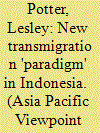

|
|
|
|
|
| Publication |
2012.
|
| Summary/Abstract |
Transmigration from Java to rural areas of the 'outer islands' appeared finished in Indonesia after the fall of the Suharto regime in 1998 and decentralisation in 2001. However, the rapid growth of oil palm plantations in the past decade has led to a renewed call for transmigrants by district heads seeking an expanded labour force. A new system has evolved on a district-to-district basis with applicants in 'sending districts' (in Java, Bali and the poorer provinces of East and West Nusa Tenggara) being matched to requests from 'receiving districts' (in Sumatra, Kalimantan, Sulawesi and Papua), which largely depend on levels of plantation investment near proposed new transmigration sites. Coordination is in the hands of a rebranded central Ministry of Manpower and Transmigration. Integral to the 'spatial' organisation of the new transmigration will be the creation of towns or cities, known as KotaTerpadu Mandiri ('Integrated self-sufficient city'). A new transmigration region (with its oil palm plantations) will form the 'embryo' for the city's growth. Although these arrangements will aim to reduce poverty, their social and environmental costs have not been evaluated. Examples of these new schemes in parts of Central Kalimantan are discussed, with brief comparisons of earlier transmigration projects.
|
|
|
|
|
|
|
|
|
|
|
|
|
|
|
|
| 4 |
ID:
117141


|
|
|
|
|
| Publication |
2012.
|
| Summary/Abstract |
This paper is concerned with food security and access to land for food crop gardening among first and second generation migrant oil palm producers in West New Britain Province, Papua New Guinea. We examine changes in food security due to the rapid population growth in the presence of growing demand for land for oil palm production. Despite oil palm providing the major source of income for most migrant households, food crop gardening remains a primary livelihood activity, particularly for women, and especially so, during periods of low oil palm prices. Rising population and land pressures pose a threat to household food security and have implications for the supply of food to the rapidly growing urban population in the province. The paper begins by describing how household food security and access to land have changed over the past two decades. Then the paper examines how smallholder households are responding to shortages of garden land through the intensification of land use, intercropping immature oil palm with food crops and seeking access to land beyond the oil palm block. The paper also considers the role that research, agricultural extension and the milling companies can play in supporting strategies to promote food security among smallholders.
|
|
|
|
|
|
|
|
|
|
|
|
|
|
|
|
| 5 |
ID:
117139
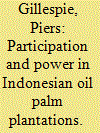

|
|
|
|
|
| Publication |
2012.
|
| Summary/Abstract |
Participation is commonly accepted to be a process that brings stakeholders together to define issues and create mutually beneficial outcomes. In the fields of development and natural resource management, participation is such a widely accepted part of policy that it is rare to find a project or programme that does not exhort the practice of participation and stakeholder engagement. However, despite the considerable weight of orthodoxy advocating greater participation and stakeholder engagement in development, the participative processes and power relations underpinning such engagement are rarely analysed in careful detail. This is particularly the case with oil palm plantations in frontier Indonesia and the interactions between the principal stakeholders at the plantation-community level. There has been minimal analysis to date appraising how such stakeholders interact in relation to a plantation, and there is limited description outlining the divergent viewpoints from such stakeholders. The paper argues that one local stakeholder group, oil palm smallholders, usually possess some agency in their decision-making and interactions with a plantation organisation but that existing structural and informal modes of interaction often limit the transformative potential of participation for all stakeholders.
|
|
|
|
|
|
|
|
|
|
|
|
|
|
|
|
| 6 |
ID:
117143
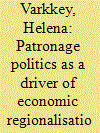

|
|
|
|
|
| Publication |
2012.
|
| Summary/Abstract |
Recent evidence has linked illegal peat and forest fires in Indonesia to commercial oil palm plantations. Fire is the most cost-efficient way to clear land for planting, but these fires release smoke causing transboundary haze pollution. The countries worst affected by the haze are neighbouring Malaysia and Singapore. Malaysian and Singaporean investors control more than two-thirds of the Indonesian oil palm plantation sector and they have been implicated in the fires alongside local plantations. Using information obtained from interviews with individuals linked to the sector, this paper aims to explain why these companies continue to burn despite the dire consequences of the haze. It identifies patronage politics as a common business culture in Southeast Asia, and argues that because these Malaysian and Singaporean investors are already familiar with patronage practices at home, they have easily inserted themselves into existing patronage networks in Indonesia. Hence, these companies enjoy the protection of their Indonesian patrons during their operations. Furthermore, in a business atmosphere defined by patronage politics, clients are largely motivated by material gain. This explains why Malaysian and Singaporean investors continue to clear land by fire in the interests of cost-efficiency, despite their home countries suffering the worst effects of haze.
|
|
|
|
|
|
|
|
|
|
|
|
|
|
|
|
| 7 |
ID:
117144


|
|
|
|
|
| Publication |
2012.
|
| Summary/Abstract |
Based on ongoing biographical research of Indonesian migrant workers in the oil palm plantations of Malaysia, this paper explores their different strategies of survival in a sector characterised by an ongoing precarity of livelihoods. The life stories of six workers from Sulawesi, Flores, Java and Sumatra are used to illustrate a tentative typology of migration experiences. As the workers set out from their own specific context of 'surplus population', they are confronted with a migration labour regime that is based on the social and political precarisation of the workers. However, in order to achieve their development aspirations, the workers find different ways of adapting to or circumventing the precarious labour regime. In particular, flight or absconding (lari) is used to change employers, to find better working conditions and to increase wages. Another key strategy is to increase the permanence of their stay, either by choosing illegality or by negotiating retrospective documentation. These strategies lead to the emergence of long-term transnational networks that change the social reality of the migration regime in the oil palm industry.
|
|
|
|
|
|
|
|
|
|
|
|
|
|
|
|
|
|
|
|
|